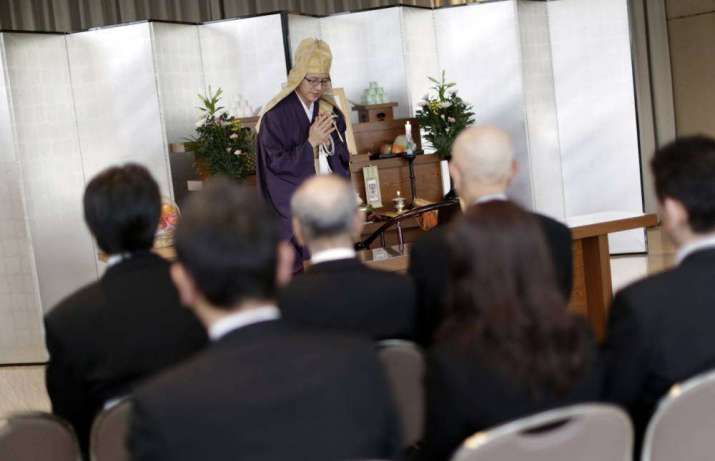
As coronavirus cases continue to increase in Japan, the nation’s funeral industry is adjusting to the population’s growing fear of crowds. While Japan has been a relative success in the region—reaching 2,000 confirmed cases at the time of writing today, with 56 deaths and 424 recoveries—concern over large gatherings is still on many people’s minds.
Yoriso Co., a funeral company based in Tokyo has responded by offering an option for the bereaved who are worried about COVID-19 to opt for cremation to take place while postponing ceremonial services. The company coordinates funerals with some 900 funeral homes and 1,300 Buddhist monks. The plan was initially created for funerals in March, but has since been extended until 30 April, with further extensions possible.
“We have been receiving daily calls from people worried about the virus and interested in the option,” said Katsumoto Nakahara, an executive officer at Yoriso. (The Japan Times)
Other companies specializing in end-of-life care are teaming up with Buddhist monks to offer variations on traditional funerals, which have become a key component of income for Buddhist monks and temples in the nation. Osaka-based Uniquest Inc. has developed an online funeral service called chiisana ososhiki—which means “small funeral”—to ensure that those who lose a loved one during the pandemic can still be present, albeit remotely, with the deceased during the final services.
“The erosion of the nuclear family has seen a surge in elderly, often single-person households and growing interest in simple, affordable funerals,” said Daichi Kuroki, a marketing director at Uniquest. “I don’t think the funeral industry as a whole will be severely impacted by the pandemic compared to other sectors, but the coronavirus will likely ramp up demand for smaller funerals.” (The Japan Times)
Mariko Namba Walter, executive director of the the Association for Central Asian Civilizations and Silk Road Studies (ACANSRS), noted: “Observing ancestral rites is a major part of Japanese Buddhist practice, and death-related rituals and services, such as funerals and memorial rites, have become the major source of monastic financing. According to folklorist Yanagida Kunio, deceased souls, which are called hotoke (buddha) or spirits (Japanese, shōrei) are purified through these memorial rites. Once pacified, they become kami (deities) after the 33rd anniversary memorial rite.” (Encyclopedia of Buddhism)
Uniquest has further adapted by allowing clients to receive kōden, or condolence money, online. The company partners with more than 4,000 funeral parlors across Japan. The move to create digital solutions was first envisioned to help family and friends who were too far away, or themselves ill or otherwise incapable of attending a regular funeral service.
“We didn’t anticipate the virus when we were creating the system,” Daichi Kuroki said. (The Japan Times)
A growing concern among mourners is contracting COVID-19 during a funeral or other gathering. In Southwest Japan’s Ehime Prefecture, it was announced today that four people had tested positive for COVID-19 after attending the same wake and funeral. As reported in The Mainichi newspaper, two of them—a man and a woman—are in their 80s, one is in his 60s, and another is in his 50s.
While some research suggests that Japan’s population is predominantly non-religious, Buddhist funerals remain common. As Buddhistdoor Global columnist and professor of religions at Luther College, Gereon Kopf notes: “The anthropologist Ian Reader famously coined the phrase that, in Japan, people are ‘born Shintō’ (Reader 1991, 55) and ‘die Buddhist’ (ibid. 77).”*
According to 2010 data from the Washington, DC-based Pew research Center, 57 per cent of Japan’s population claims no religious affiliation. 36.2 per cent of the population is Buddhist, and other religions combined make up less than 10 per cent.
* Death and Dying in Japanese Buddhism (Buddhistdoor Global)
References
Walter, Mariko Namba. 2004. “Ancestors,” in Encyclopedia of Buddhism. Buswell, Robert E. Jr, ed. pp.20–23.
Reader, Ian. 1991. Religion in Contemporary Japan.Honolulu: University of Hawaii Press.
See more
Japan coronavirus infections top 2,000 cases (Reuters)
Coronavirus pandemic fuels trend toward smaller funerals in Japan (The Japan Times)
Southwest Japan funeral ground zero for Ehime Pref. coronavirus cluster (The Mainichi)
Japan ‘On The Brink’ But Government Resists Declaring Coronavirus State Of Emergency (NPR)












